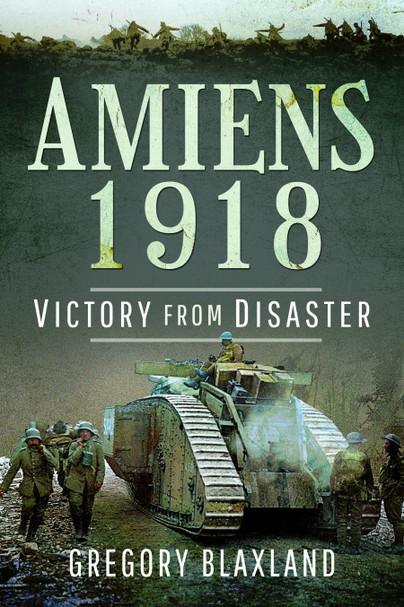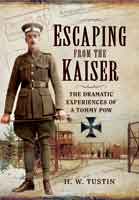Amiens 1918 (Paperback)
Victory from Disaster
Imprint: Pen & Sword Military
Pages: 288
Illustrations: 32 black and white illustrations
ISBN: 9781526796462
Published: 13th October 2020
(click here for international delivery rates)
Need a currency converter? Check XE.com for live rates
| Other formats available | Price |
|---|---|
| Amiens 1918 Hardback Add to Basket | £25.00 |
| Amiens 1918 ePub (17.7 MB) Add to Basket | £6.99 |
*This book was originally published by Frederick Muller Ltd. in 1968 and is reissued here in facsimile with revised pictures and cover.
Gregory Blaxland has written a superb account of 1918, the final year of the war when the balance of advantage between the combatants changed so dramatically in a matter of weeks that summer.
As the realities of the changing nature of warfare by late 1917 made the retention of static lines, no matter how sophisticated, no longer a long term viable option for the defence; and with Russia knocked out of the war, the Germans under Hindenburg and Ludendorff determined on a bold series of major offensives, the first of which was aimed at the British Fifth Army with the objective of seizing Amiens, a crucial rail head and the city that marked the boundary between the BEF and the French. Capture this and the Germans had a good chance of separating the key allied powers. Despite almost destroying Fifth Army and advancing within ten miles of Amiens, the Germans failed in their objective; they turned to a number of other hard thrusts along the line but were foiled on each occasions.
Reinforced by substantial numbers of American troops, the allies launched their first, French led, counter attack on 18 July, which many considered the turning point of the 1918 campaign and, indeed the whole war. Shortly afterwards, on 8 August, the BEF (with some French support) attacked with Fourth Army before Amiens and was stunningly successful – what Ludendorff described as the ‘Black Day of the German Army’. There followed a sequence of blows by all the allies along the Western Front, pushing the Germans back to the borders; with her allies collapsing and with the Imperial Navy in a state of mutiny,
The book largely concentrates on the British and Dominion troops of the BEF. The first half is taken up with the attack on Amiens (and, to a lesser extent, on Arras). In the second half of the book the author provides a cohesive account of the British response in retaking the initiative from the Germans, though not failing to give allied nations their due.
Besides giving a full narrative account, he also provides a useful critical commentary of the performance of armies and generals.
This is a welcome reprint of an accessible account of the crucial year of the war, when on the Western Front the conflict broke free of its entrenched deadlock. Despite the extraordinary achievements of the BEF in 1918, they still remain remarkably little known and even less appreciated.
"An enjoyable read"
The Western Front Association Bulletin 119
Gregory Blaxland has written a superb account of 1918, the final year of the war when the balance of advantage between the combatants changed so dramatically in a matter of weeks that summer... This is a welcome reprint of an accessible account of the crucial year of the war, when on the Western Front the conflict broke free of its entrenched deadlock. Despite the extraordinary achievements of the BEF in 1918, they still remain remarkably little known and even less appreciated.
In The Footsteps
Read the full review here
As featured by
The Armourer, January 2018
Well written and engaging.
The Great War magazine, November 2018
This book is one of the best accounts of the Battle of Amiens in 1918, one of the crucial turning points of the Great War.
HellBound, Steve Earles
Blaxland is a great storyteller as well as a historian, so this book has much to recommend it to a wide cross-section of readers.
Read the full review here
As featured in
Pillbox Study Group
This is detailed, and timely re-print, is an account of the final year of the Great War, provides a valuable, on stop overview, of the final months of the war.
Jon Sandison - Freelance
As featured on
Forces Network
As featured 'ON THE SHELF'
Wargames Illustrated, April 2018
About Gregory Blaxland
Gregory Blaxland was born less than a month after the end of WW1. He passed out of Sandhurst in July 1939 at the age of 20 and was commissioned into the Buffs. He was thus one of the youngest British Army Officers at the outbreak of WW2, and was part of the initial British Expeditionary Force in September 1939 until his evacuation from Dunkirk on May 31st 1940. He saw active service throughout the remainder of WW2, including in North Africa, Italy and Greece. After the war he continued his career as a professional soldier, and in February 1954, four months after getting married, he was sent to join his regiment in Kenya. Within 48 hours of his arrival he had contracted polio and was confined to a wheelchair for the rest of his life. He established a new career as an author and journalist, and became a successful and respected military historian. He died in 1986 at the age of 67, and was survived by his wife, son and daughter.

















